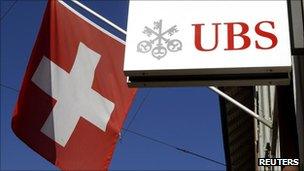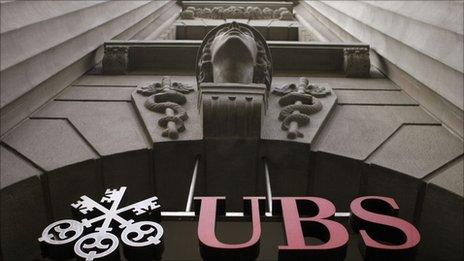When banks profit from bad news
- Published
- comments

The Swiss bank is planning to shrink its investment banking division to reduce its risks
You might think that today's announcement from UBS that it will make a small profit in its third financial quarter, in spite of its $2.3bn (£1.5bn) loss from alleged rogue trading, would be good for confidence in UBS and other big international banks.
And it is not terrible news. Except for one thing: the biggest contributor to UBS's unexpected profit is what it is known as "credit gains on financial liabilities measured at fair value" to the tune of $1.6bn or £1.1bn.
Now these are the kinds of profits that banks should not really like to make - because they imply that conditions in financial markets have become more stressed and that the price of debt issued by banks has been falling.
I will translate. Under accounting rules, which many would see as surreal, banks enjoy a profit boost when the price of the bonds or debt issued by them falls - because the idea is that, in theory, the banks could buy back a liability of $100m (for example) at the new market price of $90m, thus yielding a fat $10m profit.
Except of course this a completely notional profit that can't normally be converted into a real profit - because in stressed market conditions, banks find it hard to borrow a bean on markets (a big hello to banks in Greece, Italy and France) and aren't exactly flush with cash with which to redeem their debts.
So when you see banks like UBS talking about having made "fair value" gains on financial liabilities - or, in the more normal jargon, "profits on own credit" - the best thing to say is "yikes". Because it actually means that investors' and creditors' confidence in banks has been falling.
Which brings me back to the paradox of today's investment banking, which I alluded to in my note of last night.
The really interesting thing about the next round of investment banking results will be what the likes of Goldman and Morgan Stanley say about their longer term prospects.
It's well known that their results for this year are going to be shockingly poor. But the really interesting question, now that they've been forced by regulators to hold much more capital and cash as a protection against shocks, is when and whether they'll ever again make the bumper profits of yore.
Or to put it another way, in the absence of dangerous leverage - or huge debts relative to their capital resources - can Goldman, Morgan Stanley, Barclays Capital and so on make a decent return without a massive overhaul in their business models (management-consultant speak for huge job cuts)?
- Published4 October 2011

- Published24 September 2011

- Published24 September 2011
- Published15 September 2011
